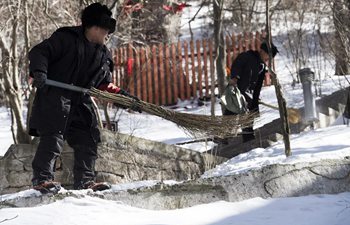CHICAGO, Feb. 1 (Xinhua) -- Temporarily shutting off neuronal signals to a healthy part of the brain may aid stroke recovery, a study in mice by researchers at Washington University School of Medicine in St. Louis found.
The researchers triggered in mice a stroke in the part of the brain that controls the right forepaw. They then trimmed whiskers in half of the mice to induce sensory deprivation in a brain region near the stroke and left the whiskers of the other mice intact.
The study was published Wednesday in Science Translational Medicine.
Mice rely on their whiskers, which are rich with nerve endings, to sense the location of objects in their environment.
The researchers measured recovery by comparing right and left forepaw use. Immediately after the strokes, both groups of mice favored their left forepaws; but by four weeks after the strokes, those with clipped whiskers had begun using their right forepaws again, and by eight weeks, they were back to using both equally.
In contrast, mice whose whiskers were not clipped showed no improvement at four weeks and only partial recovery at eight weeks.
The researchers mapped the mice's brains to find the exact area that controlled the right forepaw. In each mouse with trimmed whiskers, the locus of forepaw control had taken over part of the area that usually receives whisker sensation.
In the mice with intact whiskers, the locus of forepaw control had moved to any of several spots adjoining the site of injury.
The researchers kept the mice's whiskers trimmed for eight weeks, until they had fully recovered from the strokes and were back to using both forepaws equally. Then, they allowed the whiskers to grow back. Four weeks later, whisker control had reclaimed part of its former real estate in the brain.
Still, forepaw control remained in a corner of the area. The mice continued to have full use of their paws.
Researchers do not know whether allowing the forepaw to take over part of the area normally devoted to governing whisker movement caused the mice to lose some control over their whiskers.
But it is possible for a brain function to reach into another function's territory without any apparent ill effects.
"The part of the brain that controls fine finger movements is unusually large in musicians, and the part for navigation is enlarged in taxi drivers," said senior author Jin-Moo Lee, PhD of Washington University School of Medicine in St. Louis.
"Developing those skills doesn't cause musicians and taxi drivers to lose any other abilities. They are probably just using their brains more efficiently," Jin-Moo Lee added.
The neurological areas that govern the parts of the body are mapped out in the brain in the same order they exist in reality: The part of the brain that directs the arm is next to the area that controls the shoulder.
If brain injury causes a person to lose control of her arm, then immobilizing her shoulder would shut off neuronal signaling to the adjacent brain area, opening up space for remapping.
"Maybe we need to start thinking about improving outcomes by enhancing plasticity in targeted regions of the brain," Lee said. "This study shows that it's possible to do that, and it could lead to improved recovery."
















